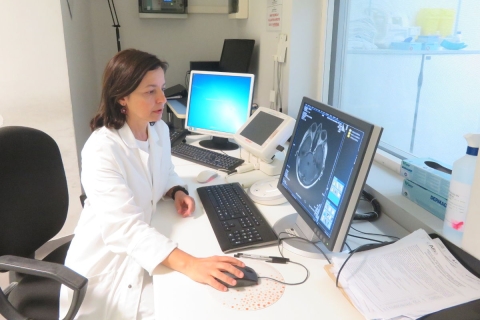Making phase II clinical trials more consistent, comparable, and informative of the biology underlying MS are among the International Progressive MS Alliance’s key goals for speeding new therapies for progressive MS.
- An expert panel of the Alliance has taken a crucial step in this direction by publishing a paper recommending changes in the way these trials are designed and conducted.
- The Alliance also proposes to launch a new funding program to advance trials that follow these recommendations, after gaining feedback from the broader MS community.
- The paper was published in Nature Reviews Neurology on January 22, 2021.
“This paper is an important milestone in the Alliance’s goal of accelerating new treatments for people with progressive MS,” stated Professor Alan Thompson, Chair of the Scientific Steering Committee of the International Progressive MS Alliance. “We look forward to getting feedback from stakeholders so that our plans for a new funding program will do even more to speed this work.”
Background: Phase II trials are the stage of testing that comes before the larger phase III trials that are required to seek regulatory approval of a therapy. Generally, phase II trials are short studies conducted to look for signs that an experimental medicine is beneficial and appears safe. How its benefit is determined can vary greatly, from imaging scans and blood tests to clinical measures of disease activity. The choice of outcome measures is critical because the decision to launch laborious and expensive phase III trials depends on whether the phase II trial is considered a success or a failure.
An expert panel of the International Progressive MS Alliance formed to encourage consistency and improve comparability in how phase II trials are currently conducted. Under the leadership of co-chairs Drs. Marco Salvetti (Sapienza University and INM) and Fernando Dangond (representative of the Alliance’s Industry Forum), the team developed the recently published recommendations.
Recommendations: The authors make the case that phase II trials can and should be informative about disease mechanisms even if their results are considered negative. They make specific comments in the paper related to study designs, types of outcome measures, and disease activity markers. Their recommendations for best practices for phase II trials include:
- Testing multiple medicines at the same time using advanced trial designs;
- Testing new therapies in combination with an approved MS therapy to reduce the potential interference of inflammation on trial results;
- Using diverse measures of disease biology, on top of a core set of outcome measures to track an experimental medicine’s effects. Core measures include:
- Clinical measures (such as upper limb dexterity) to track disability, and composite clinical outcomes, and could also include ancillary testing of mobility, vision, cognition and others (depending on characteristics of study population)
- Paraclinical tests (such as imaging, blood markers) to measure disease activity
- Tests of biological response indicators, related to mechanism of action
- Exploratory measures, such as gene transcriptomics
- Using less restrictive criteria for characteristics of people to be included in a trial;
- Using alternative clinical trial designs; and
- Soliciting feedback on feasibility of trial designs from people living with MS.
Future funding program: Another aspect of the paper focuses on a proposed future funding program to be supported by the Alliance. This program would provide grants for phase II experimental medicine trials that explore treatments and targets while generating hypotheses about disease mechanisms, using biological and clinical measures in alignment with these published recommendations.
A multi-stage review of the grant proposals would be an iterative process to encourage innovation, while improving and aligning trial designs and outcome measures so that ultimately it would be possible to compare or even combine the results of trials that were conducted separately..
Feedback on recommendations: Through a variety of forums, the Alliance will be inviting comments on these recommendations in preparation of releasing a targeted Request for Applications on Experimental Medicine Phase IIa clinical trials in progressive MS.
Facing the urgency of therapies for progressive MS — a Progressive MS Alliance proposal, by Dangond, F., Donnelly, A., Hohlfeld, R., et al, was published in Nature Reviews Neurology on January 22, 2021 (Nat Rev Neurol (2021). https://doi.org/10.1038/s41582-020-00446-9)
Authors: Fernando Dangond, Alexis Donnelly, Reinhard Hohlfeld, Catherine Lubetzki, Susan Kohlhaas, Letizia Leocani, Olga Ciccarelli, Bruno Stankoff, Maria Pia Sormani, Jeremy Chataway, Federico Bozzoli, Francesco Cucca, Lisa Melton, Timothy Coetzee, Marco Salvetti
About the International Progressive MS Alliance
The Alliance exists to accelerate the development of effective treatments for people with progressive forms of multiple sclerosis to improve quality of life worldwide. It is an unprecedented global collaboration of MS organisations, researchers, health professionals, the pharmaceutical industry, companies, trusts, foundations, donors and people affected by progressive MS, working together to address the unmet needs of people with progressive MS ─ rallying the global community to find solutions. Our promise is more than hope, it is progress.










